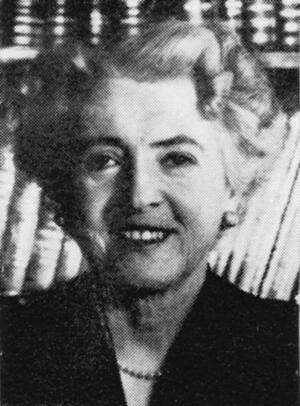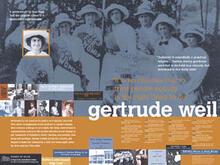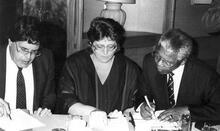Bertha Solomon
Born in Russia in 1892, Bertha Solomon moved to South Africa with her family in 1896. After obtaining her B.A. degree in 1911, she qualified and worked as a primary school teacher. As soon as restrictions on South African women practicing law were lifted in 1923, Solomon began her law studies and was admitted to the Johannesburg Bar in 1926, becoming one of the first practicing women advocates in South Africa. In 1933, after working with women’s rights and suffrage organizations to help pass the Women’s Suffrage Act of 1930, Solomon became a South African Party member. Until her retirement in 1958, Solomon was a United Party Member of Parliament, fighting for the liberalization of South Africa’s marriage laws and establishing initiatives to fight poverty within her constituency.
Overview
Bertha Solomon was one of the first women’s rights activists in South Africa. At first as a practicing advocate of the Supreme Court and then during her long career in parliament, she was indefatigable in her fight for women to be treated as equals in the eyes of the law. Paying tribute to her on her death, Sir de Villiers Graaff, the leader of South Africa’s official opposition party, described her as “the pioneer in our Parliament of the implement for the removal of the legal disabilities of women.” He maintained that all South Africans owed her a debt of great gratitude “because it is an incontestable fact that the degree of civilization of a nation can readily be established by the legal status of its women.”
Early Life and Accomplishments
Born in Minsk on January 1, 1892, Bertha was the second of Idel and Sonia Schwartz’s five children. In 1896, when she was four years old, she arrived in South Africa with her mother and older sister to join her father, who had left Tsarist Russia to escape conscription. Idel Schwartz was a fine Hebrew scholar and one of the founders of the Zionist movement in South Africa, and Bertha was brought up in an Orthodox home.
She was educated at Hope Mill Jewish School and the Good Hope Seminary School for Girls in Cape Town, whence her excellent school-leaving results won her a scholarship to the Anglican Diocesan College (Bishops), where she obtained a B.A. degree with honors in Classics in 1911. Thereafter she took a post-graduate teachers’ course at the South African College (the forerunner of the University of Cape Town), while at the same time reading for her M.A. degree in Classics. After qualifying as a teacher, Bertha taught Latin at Milburn House School for Girls in Cape Town for a year, during which time she met her future husband, Charles Solomon. They were married in 1913 and settled in Johannesburg, where their two children, Frank and Joan, were born.
Legal Career and Initial Activism
In 1923, restrictions on South African women practicing law were lifted and Bertha Solomon began her law studies. On June 1, 1926 she was admitted to the Johannesburg Bar, becoming one of the first practicing women advocates in South Africa and the first woman to plead a case before the Appellate Division of the Supreme Court in Bloemfontein.
Very early in her legal career Bertha Solomon became acutely aware of the legal disabilities of women who, married under the Common Law of Marriage in South Africa’s Roman-Dutch legal system, had effectively no legal rights at all. Married in community of property, they could not own property, had no ownership over their own income, and had no legal claim to their children. She joined the National Council of Women, an organization founded to further the cause of women’s rights, and also joined the Women’s Suffrage Movement, realizing that the marriage law could only be changed if women had direct representation in Parliament.
Early Political Career in Parliament
After years of active campaigning for voting rights for women, the Suffrage Movement achieved a partial victory with the passage of the Women’s Suffrage Act of 1930. Disappointment lay in the fact that the Act enfranchised only White and not Colored women. This Act marked Bertha Solomon’s entry into active political life. In 1933 she became a South African Party member of the Transvaal Provincial Council and from 1938 until her retirement in 1958 a United Party Member of Parliament for the constituency of Jeppe, a working-class suburb of Johannesburg. The “Poor White Problem” was a major socio-economic issue at the time and Bertha Solomon instituted a soup kitchen during the winter school holidays ,when school meals were not available. The scheme operated for twenty years, providing a much-needed service in the impoverished area. Her attempts to provide for the needs of her constituency also resulted in the opening of a municipal recreation center in Jeppe, the first of its kind in Johannesburg. Named after her, it was officially opened by the mayor in 1949, in recognition of the work she had done for her constituents.
In Parliament, Bertha Solomon started her long campaign for the liberalization of South Africa’s marriage laws. Her maiden speech in parliament dealt with women’s rights, but the outbreak of World War II resulted in her Matrimonial Affairs Bill being temporarily shelved. However, another cause long championed by Bertha Solomon was brought to a successful legal conclusion: in 1942, the Motor Vehicle Insurance Act was passed, introducing compulsory third party automobile insurance. Through her legal practice, Bertha Solomon was made aware of the physical and economic suffering of motor accident victims and the passing of that Act was a significant victory for her.
Political Career after the Implementation of Apartheid
After the end of World War II, Bertha Solomon was instrumental in persuading the Prime Minister, General Smuts, to establish a judicial Commission to investigate the position and status of women in South Africa. However, by the time the Commission presented its findings, which endorsed the crucial need for changes, the National Party had won the 1948 elections and was more concerned with implementing its apartheid policies than dealing with the status of women.
Re-elected to Parliament in 1948, now as an Opposition party member, Bertha Solomon began the uphill battle of re-introducing her Matrimonial Affairs Bill. Eventually the Bill, dubbed “Bertha’s Bill” by the Nationalist Prime Minister Dr. Malan, was passed in August 1953 and came into law as the Matrimonial Affairs Act No. 37 of 1953. The parliamentary battles to secure equal rights for women in all areas of South African life were not yet over, however. Until her retirement in 1958 Bertha Solomon continued to act as a parliamentary watchdog over women’s rights and to castigate government politicians when those rights were ignored.
Following in the footsteps of her parents, Bertha Solomon was a keen Zionist. She frequently visited Israel where her daughter Joan (who had married Michael Comay, later Israel’s Ambassador to the United Nations 1960–1967) and her family lived. Like her father, she greatly admired the Hebrew University of Jerusalem and in 1958 she was present at the dedication ceremony of the Idel and Sonia Schwartz Lecture Hall on its campus.
In 1967 Bertha Solomon was awarded an honorary doctorate in law by the University of the Witwatersrand in recognition “of the contribution she had made to the common weal during her twenty years of service as a Member of Parliament.” She died on November 22, 1969 at the age of seventy-seven.
Solomon, Bertha. Time Remembered: The Story of a Fight. Cape Town: 1968.
Jaff, Fay. Women South Africa Remembers. Cape Town: 1975.
Katz, Elaine N. “Bertha Solomon: A Feminist for her Time.” Jewish Affairs 48 (2) (1993): 100–103.





